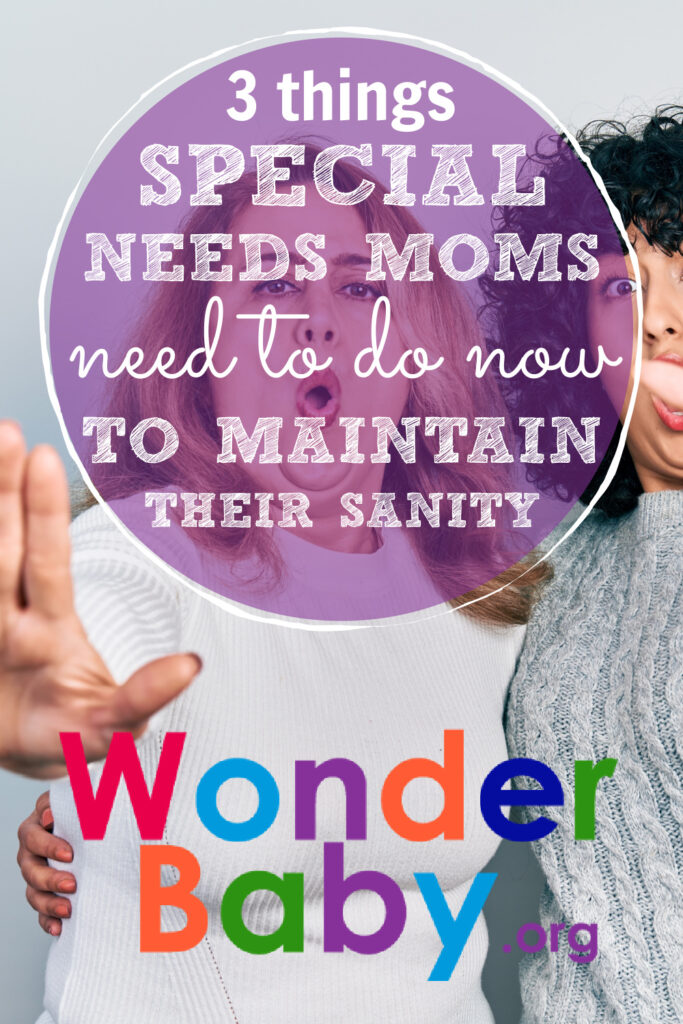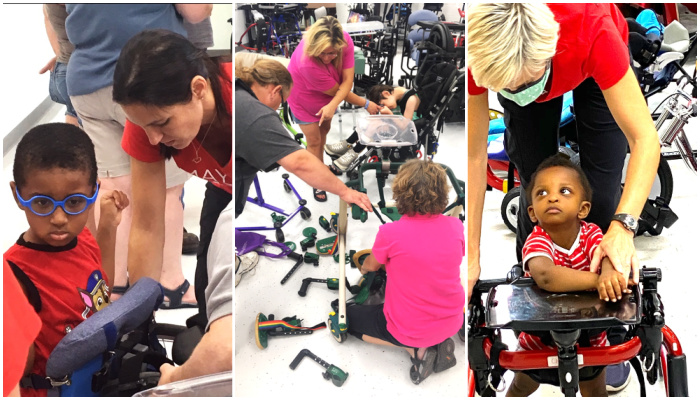3 Things All Special Needs Moms Need To Do Now To Maintain Their Sanity

If you’ve ever flown, you’ve probably heard the safety announcement to “put your oxygen mask on first before helping others” in case of an emergency. There are two reasons why airlines have to tell us this: First, they know that a parent cannot help their child if they are unable to breathe themselves. But more to the point, airlines also know that it is our instinct as parents to reach for our children first in an emergency and leave our own needs as an afterthought.
Parents of typically developing children can probably relate to this concept. If their child were to be diagnosed with an illness, they would do whatever they could to ease the pain and suffering of their child. They would stay up nights in the hospital, research cures, and find the best specialists. They would forgo their own needs to help their children through the emergency.
This oxygen mask scenario is often used as an analogy for self-care. If you let yourself crash, you won’t be able to help others. But I’ve also seen this concept criticized as being too simplistic. The analogy assumes that you will only find the need for self-care when things are so bad that you are rhetorically on a crashing plane, but self-care needs to be a priority at all times, good and bad.
Parents of special needs children have a completely different perspective, though. Do we have good and bad times? Certainly. But in many ways, our lives are always in emergency mode. It’s natural for us to go above and beyond for our children, but we need to remember that if the parent crashes, the child will eventually crash as well.
When do you take a break and say stop in a situation that doesn’t have a set start and finish date (like a treatment plan you might have for a sick child)? When do you recalculate and develop a different plan that gives you what you need as well?
There is a fine line between doing what needs to be done for your child and looking after yourself. Can we, as special needs parents, even see that line?
Here are three things you can do now to define that line clearly.

1. Prioritize Sleep
When my son was very young, he didn’t sleep much. Or, to be more accurate, didn’t really sleep at all. He would fall asleep very late and then not stay asleep very long.
At the time, I was also trying to hold a full-time job, and it wasn’t long before I felt like I was crashing. My patience was low. I was tired, exhausted, and not functioning well.
I remember we had a doctor’s appointment. I was super tired and talked with the doctor and at some point probably even cried at the appointment from sheer exhaustion. I needed to sleep, and that’s when we started a sleep aid medication for my son.
Yes, ideally probably not something I would have chosen to give my son at such a young age, but I was crashing, and I needed to find a way to help myself in that crisis as well.
Luckily I got my sleep back for the most part, and my son did too. We both benefited, even if I had to make a decision I was initially uncomfortable with. Prioritize your sleep however you can.
If you need tips on how to get more sleep, check out 7 Tips for Sleep-Deprived Special Needs Parents.

2. Cut Back Therapies
Another question I have debated over the years is how many therapies does my son truly need? Can I see the difference between a therapy that is useful and essential, fun but unnecessary, or even a complete waste of time and expense (even if covered by insurance)?
I’m sure that even with typical children, many parents debate how many afterschool activities they should involve their kids in. Driving from one activity to the other is not easy and can be costly. Not only financially but also emotionally.
As a mother to a special needs son, though, I have to wonder if I do another therapy, will it really benefit him? Will it make a significant difference? Will it teach him an important skill? Will it help his future?
Every time he gained a new skill, I could never tell for sure if it was due to a specific therapy (during school or after) or just him growing and improving on his own. Should I take him to more therapies after a long day at school or not? And if I skip a therapy, am I doing him a great disservice?
As a parent to a special needs child, I have heard more than once that the more therapies a child receives, especially at a young age, the better. I’ve been told to not give up and to sometimes even not listen to therapists or doctors who say a skill is most likely unachievable. I’ve been told that everything is possible and I just need to push and advocate for my child.
This is a question we have to face as special needs parents. Sometimes it’s ok to pull back on all those therapies and just let our children be themselves (for the good and the bad) and find respite time for ourselves as well.

3. Consider the Big Picture
At some point, someone wise who was on a similar journey told me to choose my battles and prioritize my goals. They told me to try to put only a few goals at the top of our list and separate what’s easier and what’s not. What’s feasible and more realistic and what’s not. What will help him in his future and what is just something society thinks is important?
They told me to think what I would say if someone else told me their schedule… they said we are at times very good at giving advice to others and not looking at ourselves and giving ourselves a break as well.
This advice helped me pause and stop some of the activities, shift gears, and let my son have more downtime. Yes, sometimes he may be bored, but he’s calm, I am rested, and we are focusing on what’s most important at a given time.
Another very important tip I learned was to trust your instinct. To question even some of the specialists and listen to your gut instincts and your child. Therapies are not one-size-fits-all. A certain therapy could work great for one child and not for another. It could work great for a certain time and then not work anymore. It could work great with one therapist and not with another. If something doesn’t feel correct – stop and question it and decide if it is really needed and helpful or not.
For example, my son is (among other issues) completely blind, yet one of his therapists decided it was important that at age twelve, he learned to wave. Waving is something very visual. It was meaningless to him and just caused him to be upset. If someone says his name – he will extend his hand and smile and sometimes walk towards them. But he won’t wave, and that is ok with me.

Related Posts

Assistive Technology, Support
May We Help: Engineering Independence for People with Disabilities
May We Help is dedicated to designing and building custom solutions that help individuals of all ages achieve mobility, access, and independence, all at no cost.

Special Needs, Support
Five Steps to Finding Joy: Faith and the Journey of Parenting with Special Needs
Through faith special needs parents can learn to cultivate a deep, enduring state of joy.

Special Needs, Support
How Do You Keep Faith Alive When Your Child Remains Ill?
I understand the emotional toll of chronic illness, but I also believe in the power of faith and community to uplift and sustain us.